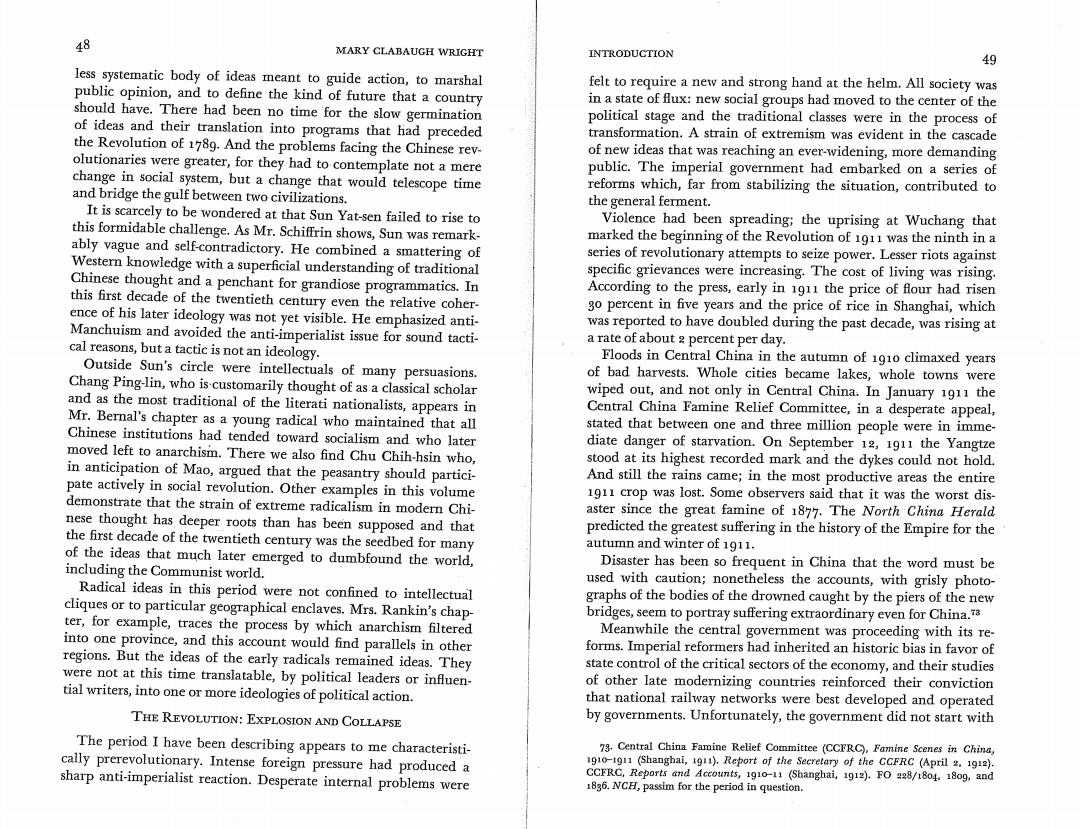
48 MARY CLABAUGH WRIGHT INTRODUCTION 49 less systematic body of ideas meant to guide action,to marshal public opinion,and to define the kind of future that a country felt to require a new and strong hand at the helm.All society was should have.There had been no time for the slow germination in a state of flux:new social groups had moved to the center of the of ideas and their translation into programs that had preceded political stage and the traditional classes were in the process of the Revolution of 1789.And the problems facing the Chinese rev- transformation.A strain of extremism was evident in the cascade olutionaries were greater,for they had to contemplate not a mere of new ideas that was reaching an ever-widening,more demanding change in social system,but a change that would telescope time public.The imperial government had embarked on a series of and bridge the gulf between two civilizations. reforms which,far from stabilizing the situation,contributed to the general ferment. It is scarcely to be wondered at that Sun Yat-sen failed to rise to this formidable challenge.As Mr.Schiffrin shows,Sun was remark- Violence had been spreading;the uprising at Wuchang that ably vague and self-contradictory.He combined a smattering of marked the beginning of the Revolution of 1911 was the ninth in a Western knowledge with a superficial understanding of traditional series of revolutionary attempts to seize power.Lesser riots against Chinese thought and a penchant for grandiose programmatics.In specific grievances were increasing.The cost of living was rising. this first decade of the twentieth century even the relative coher- According to the press,early in 1911 the price of four had risen ence of his later ideology was not yet visible.He emphasized anti- 30 percent in five years and the price of rice in Shanghai,which Manchuism and avoided the anti-imperialist issue for sound tacti- was reported to have doubled during the past decade,was rising at cal reasons,but a tactic is not an ideology. a rate of about 2 percent per day. Outside Sun's circle were intellectuals of many persuasions. Floods in Central China in the autumn of 1910 climaxed years Chang Ping-lin,who is-customarily thought of as a classical scholar of bad harvests.Whole cities became lakes,whole towns were and as the most traditional of the literati nationalists,appears in wiped out,and not only in Central China.In January 1911 the Mr.Bernal's chapter as a young radical who maintained that all Central China Famine Relief Committee,in a desperate appeal, Chinese institutions had tended toward socialism and who later stated that between one and three million people were in imme- moved left to anarchism.There we also find Chu Chih-hsin who, diate danger of starvation.On September 12,1911 the Yangtze in anticipation of Mao,argued that the peasantry should partici- stood at its highest recorded mark and the dykes could not hold. pate actively in social revolution.Other examples in this volume And still the rains came;in the most productive areas the entire demonstrate that the strain of extreme radicalism in modern Chi- 1911 crop was lost.Some observers said that it was the worst dis- nese thought has deeper roots than has been supposed and that aster since the great famine of 1877.The North China Herald the first decade of the twentieth century was the seedbed for many predicted the greatest suffering in the history of the Empire for the autumn and winter of 1911. of the ideas that much later emerged to dumbfound the world, including the Communist world. Disaster has been so frequent in China that the word must be Radical ideas in this period were not confined to intellectual used with caution;nonetheless the accounts,with grisly photo- cliques or to particular geographical enclaves.Mrs.Rankin's chap- graphs of the bodies of the drowned caught by the piers of the new ter,for example,traces the process by which anarchism filtered bridges,seem to portray suffering extraordinary even for China.7a into one province,and this account would find parallels in other Meanwhile the central government was proceeding with its re- regions.But the ideas of the early radicals remained ideas.They forms.Imperial reformers had inherited an historic bias in favor of were not at this time translatable,by political leaders or influen- state control of the critical sectors of the economy,and their studies tial writers,into one or more ideologies of political action. of other late modernizing countries reinforced their conviction that national railway networks were best developed and operated THE REVOLUTION:EXPLOSION AND COLLAPSE by governments.Unfortunately,the government did not start with The period I have been describing appears to me characteristi- 73.Central China Famine Relief Committee(CCFRC),Famine Scenes in China, cally prerevolutionary.Intense foreign pressure had produced a 1910-1911 (Shanghai,1911).Report of the Secretary of the GCFRC (April 2.1912). sharp anti-imperialist reaction.Desperate internal problems were CCFRC,Reports and Accounts,1910-11 (Shanghai,1912).FO 28/1804.1809.and 836.NCH,passim for the period in question
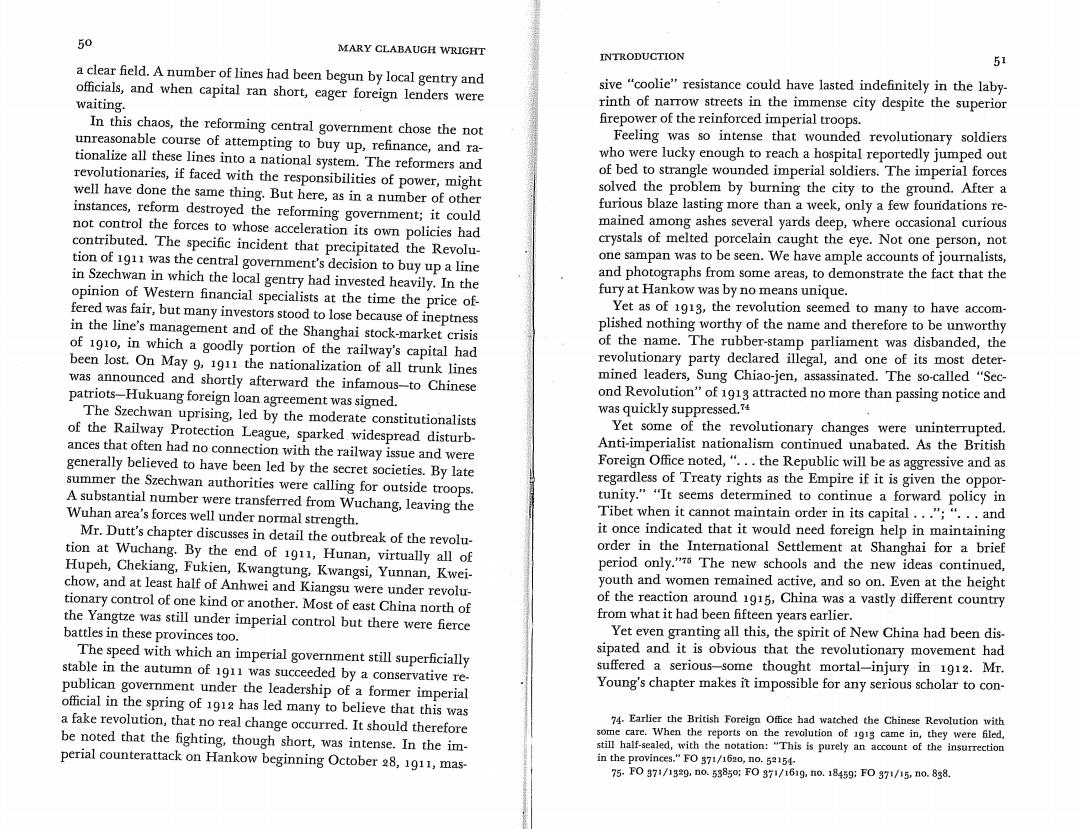
50 MARY CLABAUGH WRIGHT INTRODUCTION 51 a clear field.A number of lines had been begun by local gentry and officials,and when capital ran short,eager foreign lenders were sive "coolie"resistance could have lasted indefinitely in the laby- waiting. rinth of narrow streets in the immense city despite the superior In this chaos,the reforming central government chose the not firepower of the reinforced imperial troops. unreasonable course of attempting to buy up,refinance,and ra- Feeling was so intense that wounded revolutionary soldiers tionalize all these lines into a national system.The reformers and who were lucky enough to reach a hospital reportedly jumped out revolutionaries,if faced with the responsibilities of power,might of bed to strangle wounded imperial soldiers.The imperial forces well have done the same thing.But here,as in a number of other solved the problem by burning the city to the ground.After a instances,reform destroyed the reforming government;it could furious blaze lasting more than a week,only a few foundations re- not control the forces to whose acceleration its own policies had mained among ashes several yards deep,where occasional curious contributed.The specific incident that precipitated the Revolu- crystals of melted porcelain caught the eye.Not one person,not tion of 1911 was the central government's decision to buy up a line one sampan was to be seen.We have ample accounts of journalists, in Szechwan in which the local gentry had invested heavily.In the and photographs from some areas,to demonstrate the fact that the opinion of Western financial specialists at the time the price of- fury at Hankow was by no means unique. fered was fair,but many investors stood to lose because of ineptness Yet as of 1913,the revolution seemed to many to have accom- in the line's management and of the Shanghai stock-market crisis plished nothing worthy of the name and therefore to be unworthy of ig10,in which a goodly portion of the railway's capital had of the name.The rubber-stamp parliament was disbanded,the been lost.On May 9,1911 the nationalization of all trunk lines revolutionary party declared illegal,and one of its most deter- was announced and shortly afterward the infamous-to Chinese mined leaders,Sung Chiao-jen,assassinated.The so-called "Sec- patriots-Hukuang foreign loan agreement was signed. ond Revolution"of 1913 attracted no more than passing notice and The Szechwan uprising,led by the moderate constitutionalists was quickly suppressed.74 of the Railway Protection League,sparked widespread disturb- Yet some of the revolutionary changes were uninterrupted. ances that often had no connection with the railway issue and were Anti-imperialist nationalism continued unabated.As the British generally believed to have been led by the secret societies.By late Foreign Office noted,"..the Republic will be as aggressive and as summer the Szechwan authorities were calling for outside troops. regardless of Treaty rights as the Empire if it is given the oppor- A substantial number were transferred from Wuchang,leaving the tunity.""It seems determined to continue a forward policy in Wuhan area's forces well under normal strength. Tibet when it cannot maintain order in its capital...";"...and Mr.Dutt's chapter discusses in detail the outbreak of the revolu- it once indicated that it would need foreign help in maintaining tion at Wuchang.By the end of 1g11,Hunan,virtually all of order in the International Settlement at Shanghai for a brief Hupeh,Chekiang,Fukien,Kwangtung,Kwangsi,Yunnan,Kwei- period only."75 The new schools and the new ideas continued, chow,and at least half of Anhwei and Kiangsu were under revolu- youth and women remained active,and so on.Even at the height tionary control of one kind or another.Most of east China north of of the reaction around 1915,China was a vastly different country the Yangtze was still under imperial control but there were fierce from what it had been fifteen years earlier. battles in these provinces too. Yet even granting all this,the spirit of New China had been dis- The speed with which an imperial government still superficially sipated and it is obvious that the revolutionary movement had stable in the autumn of 1911 was succeeded by a conservative re- suffered a serious-some thought mortal-injury in 1912.Mr. publican government under the leadership of a former imperial Young's chapter makes it impossible for any serious scholar to con- official in the spring of 1912 has led many to believe that this was a fake revolution,that no real change occurred.It should therefore 74.Earlier the British Foreign Office had watched the Chinese Revolution with be noted that the fighting,though short,was intense.In the im- some care.When the reports on the revolution of 1g1s came in,they were filed, perial counterattack on Hankow beginning October 28,1911,mas- still half-sealed,with the notation:"This is purely an account of the insurrection in the provinces."FO 371/1620,no.53154 75.下0371/139,n0.53850:F0371/161g,n0.18459:F037/15,n0.838
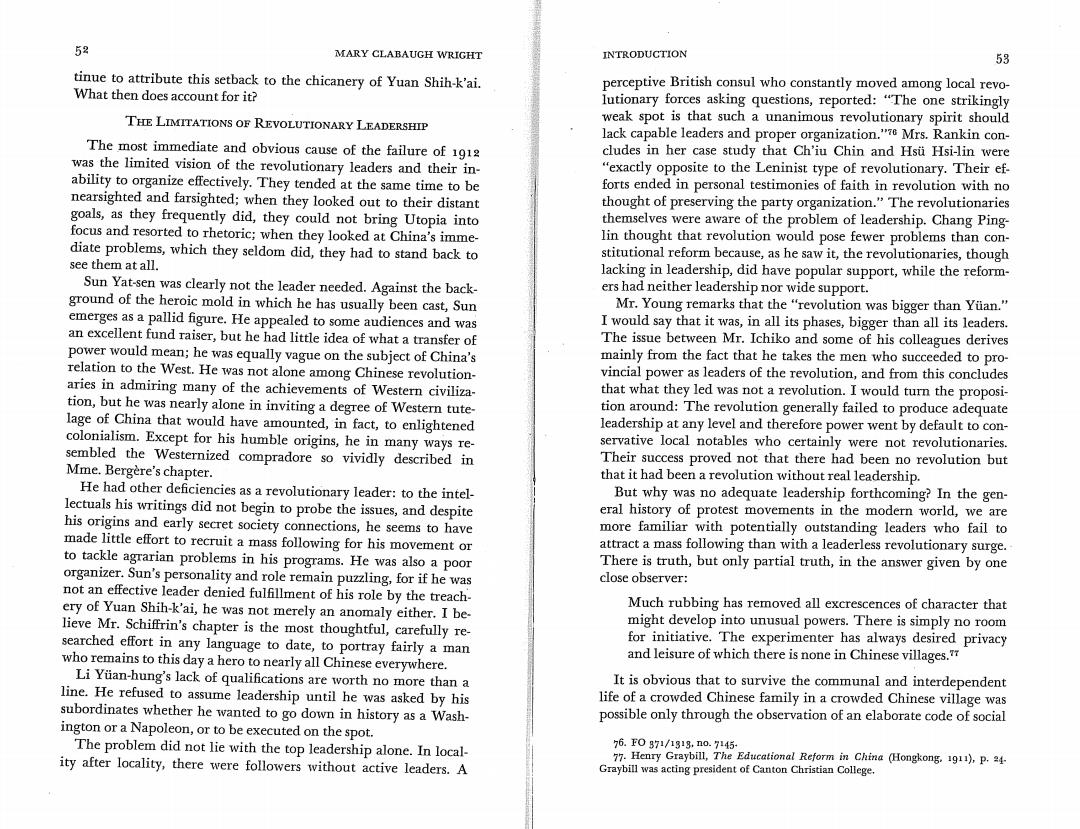
52 MARY CLABAUGH WRIGHT INTRODUCTION 53 tinue to attribute this setback to the chicanery of Yuan Shih-k'ai. perceptive British consul who constantly moved among local revo- What then does account for it? lutionary forces asking questions,reported:"The one strikingly THE LIMITATIONS OF REVOLUTIONARY LEADERSHIP weak spot is that such a unanimous revolutionary spirit should lack capable leaders and proper organization."Mrs.Rankin con- The most immediate and obvious cause of the failure of 1912 cludes in her case study that Ch'iu Chin and Hsui Hsi-lin were was the limited vision of the revolutionary leaders and their in- "exactly opposite to the Leninist type of revolutionary.Their ef- ability to organize effectively.They tended at the same time to be forts ended in personal testimonies of faith in revolution with no nearsighted and farsighted;when they looked out to their distant thought of preserving the party organization."The revolutionaries goals,as they frequently did,they could not bring Utopia into themselves were aware of the problem of leadership.Chang Ping- focus and resorted to rhetoric;when they looked at China's imme- lin thought that revolution would pose fewer problems than con- diate problems,which they seldom did,they had to stand back to stitutional reform because,as he saw it,the revolutionaries,though see them at all. lacking in leadership,did have popular support,while the reform- Sun Yat-sen was clearly not the leader needed.Against the back- ers had neither leadership nor wide support. ground of the heroic mold in which he has usually been cast,Sun Mr.Young remarks that the"revolution was bigger than Yuian." emerges as a pallid figure.He appealed to some audiences and was I would say that it was,in all its phases,bigger than all its leaders. an excellent fund raiser,but he had little idea of what a transfer of The issue between Mr.Ichiko and some of his colleagues derives power would mean;he was equally vague on the subject of China's mainly from the fact that he takes the men who succeeded to pro- relation to the West.He was not alone among Chinese revolution- vincial power as leaders of the revolution,and from this concludes aries in admiring many of the achievements of Western civiliza- that what they led was not a revolution.I would turn the proposi- tion,but he was nearly alone in inviting a degree of Western tute- tion around:The revolution generally failed to produce adequate lage of China that would have amounted,in fact,to enlightened leadership at any level and therefore power went by default to con- colonialism.Except for his humble origins,he in many ways re- servative local notables who certainly were not revolutionaries sembled the Westernized compradore so vividly described in Their success proved not that there had been no revolution but Mme.Bergere's chapter. that it had been a revolution without real leadership. He had other deficiencies as a revolutionary leader:to the intel- But why was no adequate leadership forthcoming?In the gen- lectuals his writings did not begin to probe the issues,and despite eral history of protest movements in the modern world,we are his origins and early secret society connections,he seems to have more familiar with potentially outstanding leaders who fail to made little effort to recruit a mass following for his movement or attract a mass following than with a leaderless revolutionary surge. to tackle agrarian problems in his programs.He was also a poor There is truth,but only partial truth,in the answer given by one organizer.Sun's personality and role remain puzzling,for if he was close observer: not an effective leader denied fulfillment of his role by the treach- ery of Yuan Shih-k'ai,he was not merely an anomaly either.I be- Much rubbing has removed all excrescences of character that lieve Mr.Schiffrin's chapter is the most thoughtful,carefully re- might develop into unusual powers.There is simply no room searched effort in any language to date,to portray fairly a man for initiative.The experimenter has always desired privacy who remains to this day a hero to nearly all Chinese everywhere. and leisure of which there is none in Chinese villages. Li Yiian-hung's lack of qualifications are worth no more than a It is obvious that to survive the communal and interdependent line.He refused to assume leadership until he was asked by his life of a crowded Chinese family in a crowded Chinese village was subordinates whether he wanted to go down in history as a Wash- possible only through the observation of an elaborate code of social ington or a Napoleon,or to be executed on the spot. The problem did not lie with the top leadership alone.In local- 76.F0g71/1313,n0.7145 ity after locality,there were followers without active leaders.A 77.Henry Graybill,The Educational Reform in China (Hongkong.1911),P.4 Graybill was acting president of Canton Christian College
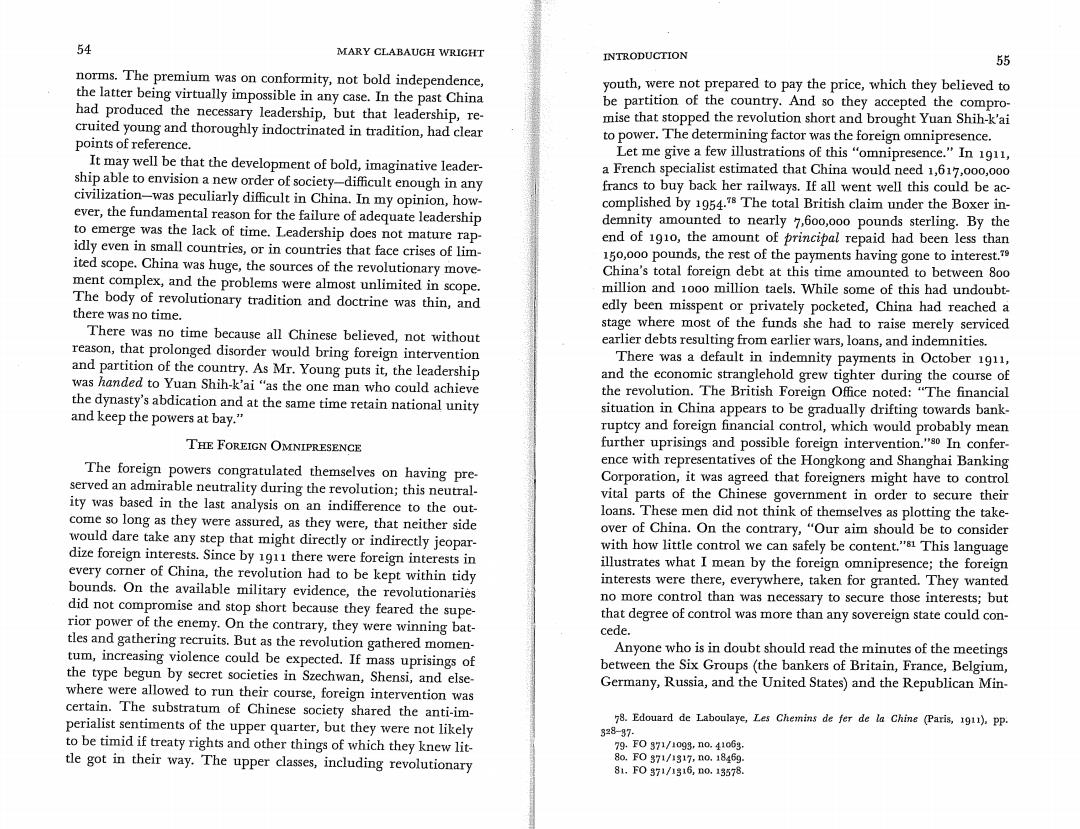
54 MARY CLABAUGH WRIGHT INTRODUCTION 55 norms.The premium was on conformity,not bold independence, the latter being virtually impossible in any case.In the past China youth,were not prepared to pay the price,which they believed to had produced the necessary leadership,but that leadership,re- be partition of the country.And so they accepted the compro- mise that stopped the revolution short and brought Yuan Shih-k'ai cruited young and thoroughly indoctrinated in tradition,had clear points of reference. to power.The determining factor was the foreign omnipresence. It may well be that the development of bold,imaginative leader- Let me give a few illustrations of this "omnipresence."In 1911, ship able to envision a new order of society-difficult enough in any a French specialist estimated that China would need 1,617,000,000 civilization-was peculiarly difficult in China.In my opinion,how- francs to buy back her railways.If all went well this could be ac- complished by 1954."8 The total British claim under the Boxer in- ever,the fundamental reason for the failure of adequate leadership to emerge was the lack of time.Leadership does not mature rap- demnity amounted to nearly 7,600,o0o pounds sterling.By the idly even in small countries,or in countries that face crises of lim- end of 1910,the amount of principal repaid had been less than ited scope.China was huge,the sources of the revolutionary move- 150,o00 pounds,the rest of the payments having gone to interest. ment complex,and the problems were almost unlimited in scope. China's total foreign debt at this time amounted to between 800 million and 1000 million taels.While some of this had undoubt- The body of revolutionary tradition and doctrine was thin,and there was no time. edly been misspent or privately pocketed,China had reached a There was no time because all Chinese believed,not without stage where most of the funds she had to raise merely serviced reason,that prolonged disorder would bring foreign intervention earlier debts resulting from earlier wars,loans,and indemnities. and partition of the country.As Mr.Young puts it,the leadership There was a default in indemnity payments in October 1911, was handed to Yuan Shih-k'ai"as the one man who could achieve and the economic stranglehold grew tighter during the course of the dynasty's abdication and at the same time retain national unity the revolution.The British Foreign Office noted:"The financial and keep the powers at bay." situation in China appears to be gradually drifting towards bank- ruptcy and foreign financial control,which would probably mean THE FOREIGN OMNIPRESENCE further uprisings and possible foreign intervention."80 In confer- The foreign powers congratulated themselves on having pre- ence with representatives of the Hongkong and Shanghai Banking served an admirable neutrality during the revolution;this neutral- Corporation,it was agreed that foreigners might have to control ity was based in the last analysis on an indifference to the out- vital parts of the Chinese government in order to secure their come so long as they were assured,as they were,that neither side loans.These men did not think of themselves as plotting the take- would dare take any step that might directly or indirectly jeopar- over of China.On the contrary,"Our aim should be to consider dize foreign interests.Since by 1911 there were foreign interests in with how little control we can safely be content."This language every corner of China,the revolution had to be kept within tidy illustrates what I mean by the foreign omnipresence;the foreign bounds.On the available military evidence,the revolutionaries interests were there,everywhere,taken for granted.They wanted did not compromise and stop short because they feared the supe- no more control than was necessary to secure those interests;but rior power of the enemy.On the contrary,they were winning bat- that degree of control was more than any sovereign state could con- tles and gathering recruits.But as the revolution gathered momen- cede. tum,increasing violence could be expected.If mass uprisings of Anyone who is in doubt should read the minutes of the meetings the type begun by secret societies in Szechwan,Shensi,and else- between the Six Groups(the bankers of Britain,France,Belgium, where were allowed to run their course,foreign intervention was Germany,Russia,and the United States)and the Republican Min- certain.The substratum of Chinese society shared the anti-im- perialist sentiments of the upper quarter,but they were not likely 78.Edouard de Laboulaye,Les Chemins de fer de ia Chine (Paris,1911).pp. 328-37. to be timid if treaty rights and other things of which they knew lit- 79.F0371/1093,no.41c6g. tle got in their way.The upper classes,including revolutionary 8o.F0371/1317,n0.1845g 81.F0371/小316,n0.13578
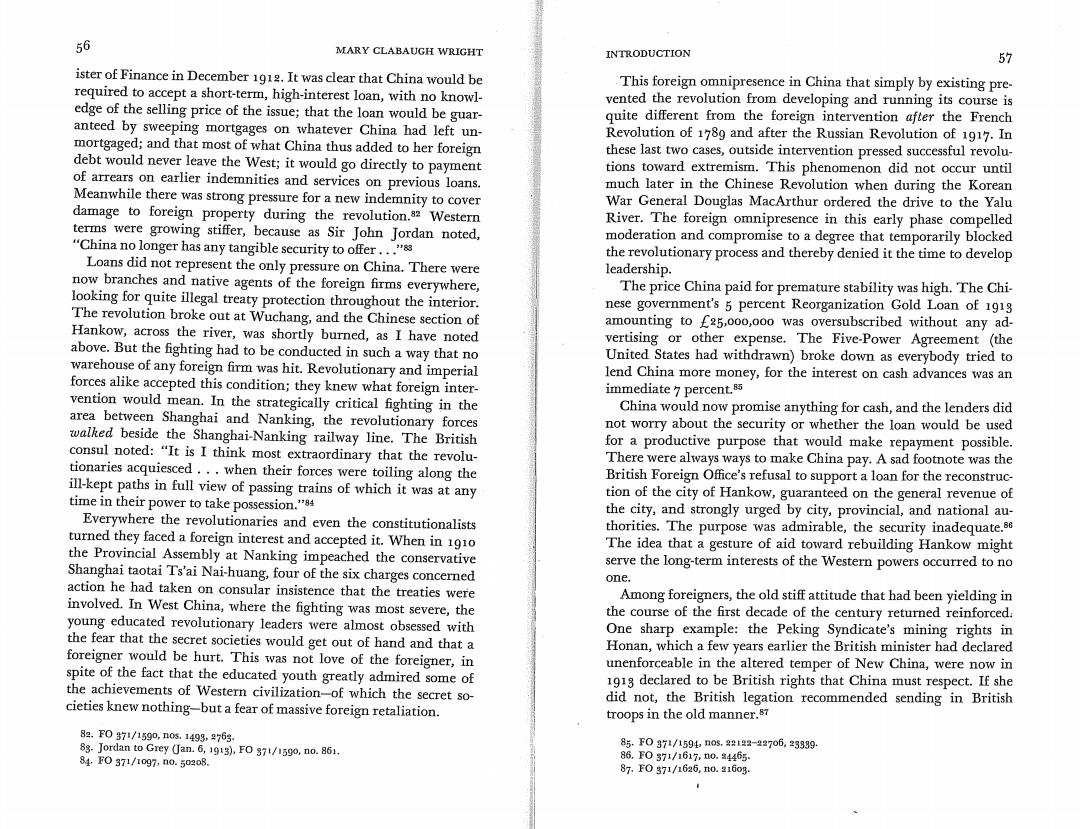
56 MARY CLABAUGH WRIGHT INTRODUCTION 57 ister of Finance in December 1913.It was clear that China would be This foreign omnipresence in China that simply by existing pre- required to accept a short-term,high-interest loan,with no knowl- vented the revolution from developing and running its course is edge of the selling price of the issue;that the loan would be guar- quite different from the foreign intervention after the French anteed by sweeping mortgages on whatever China had left un- Revolution of 1789 and after the Russian Revolution of 1917.In mortgaged;and that most of what China thus added to her foreign debt would never leave the West;it would go directly to payment these last two cases,outside intervention pressed successful revolu- tions toward extremism.This phenomenon did not occur until of arrears on earlier indemnities and services on previous loans. much later in the Chinese Revolution when during the Korean Meanwhile there was strong pressure for a new indemnity to cover War General Douglas MacArthur ordered the drive to the Yalu damage to foreign property during the revolution.s2 Western terms were growing stiffer,because as Sir John Jordan noted, River.The foreign omnipresence in this early phase compelled "China no longer has any tangible security to offer..." moderation and compromise to a degree that temporarily blocked the revolutionary process and thereby denied it the time to develop Loans did not represent the only pressure on China.There were leadership. now branches and native agents of the foreign firms everywhere, looking for quite illegal treaty protection throughout the interior. The price China paid for premature stability was high.The Chi- The revolution broke out at Wuchang,and the Chinese section of nese government's 5 percent Reorganization Gold Loan of 191g Hankow,across the river,was shortly burned,as I have noted amounting to f25,000,o00 was oversubscribed without any ad- above.But the fighting had to be conducted in such a way that no vertising or other expense.The Five-Power Agreement (the United States had withdrawn)broke down as everybody tried to warehouse of any foreign firm was hit.Revolutionary and imperial forces alike accepted this condition;they knew what foreign inter- lend China more money,for the interest on cash advances was an immediate percent.85 vention would mean.In the strategically critical fighting in the area between Shanghai and Nanking,the revolutionary forces China would now promise anything for cash,and the lenders did not worry about the security or whether the loan would be used walked beside the Shanghai-Nanking railway line.The British consul noted:"It is I think most extraordinary that the revolu- for a productive purpose that would make repayment possible. tionaries acquiesced...when their forces were toiling along the There were always ways to make China pay.A sad footnote was the ill-kept paths in full view of passing trains of which it was at any British Foreign Office's refusal to support a loan for the reconstruc- time in their power to take possession.4 tion of the city of Hankow,guaranteed on the general revenue of Everywhere the revolutionaries and even the constitutionalists the city,and strongly urged by city,provincial,and national au- thorities.The purpose was admirable,the security inadequate.s turned they faced a foreign interest and accepted it.When in 191o the Provincial Assembly at Nanking impeached the conservative The idea that a gesture of aid toward rebuilding Hankow might Shanghai taotai Ts'ai Nai-huang,four of the six charges concerned serve the long-term interests of the Western powers occurred to no one. action he had taken on consular insistence that the treaties were involved.In West China,where the fighting was most severe,the Among foreigners,the old stiff attitude that had been yielding in young educated revolutionary leaders were almost obsessed with the course of the first decade of the century returned reinforced. the fear that the secret societies would get out of hand and that a One sharp example:the Peking Syndicate's mining rights in Honan,which a few years earlier the British minister had declared foreigner would be hurt.This was not love of the foreigner,in spite of the fact that the educated youth greatly admired some of unenforceable in the altered temper of New China,were now in the achievements of Western civilization-of which the secret so- 1913 declared to be British rights that China must respect.If she did not,the British legation recommended sending in British cieties knew nothing-but a fear of massive foreign retaliation. troops in the old manner.87 82.F0371/1590,n0s.1498,2763 8.Jordan to Grey (Jan.6,1913).FO 371/15g0,no.861. 85.F0371/1594,n0s.g9193-427o6,23399. 84.F0371/1097,n0.50208. 86.F0371/1617,n0.4465. 87,F0371/h625,no.216og-